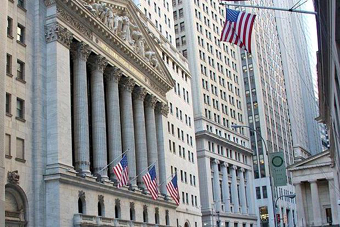
The Dow's Thursday Stampede
| published July 31, 2014 |
By Thursday Review staff
You can blame it on a lot of things: Tensions in the Ukraine and the harsh expectation of wider sanctions against Russia; Argentina’s default on its payment of half a billion dollars in interest, its second major default in 14 years; worries about inflation as food prices and energy costs continue to rise in the U.S.; even the horrible escalations of violence in the Middle East, where the continuous fighting between Israel and Hamas militants has already caused at least 1700 deaths.
Whatever the reasons, U.S. stock markets were spooked into a negative stampede as markets around the world also fell sharply. The sell-off was more-or-less worldwide, but in New York the Dow fell 317 points in a single day, the worst downturn in stock value this spring and only the second worst day since the winter selloff of February 3 this year. The NASDAQ 100 Index lost a little over two percent.
The market selloff erased all positive gains made in 2014.
At the core of the international selloff were inter-connected concerns about a new, more potent round of sanctions against Russia by the 28-member European Union. Europe’s economy has not fully recovered from the Great Recession, nor has it emerged from its difficult times with austerity and debt in the years that followed. With billions in trade with Russia, the EU faces concerns that its sanctions may inhibit recovery, or, worse still, trigger another round of market shock and pain, even recession. Many European economies are dependent to some degree on Russian oil and gas, as well as a heavy balance of trade in technology and electronics. Germany, for example, did more than $88 billion in business with Russia in 2013. Before the Ukrainian crisis began, European economists had forecast that trade with Russia would increase in 2014, and along with it much of Europe's economic news would brighten.
But the Ukrainian crisis—and the downing of Malaysian airlines MH-17 at the hands of pro-Russian militants—has forced many European leaders to reassess their relationship with Russia and its president, Vladimir Putin. Days ago, the EU voted to impose a wide battery of sanctions against Russia—some targeted at Putin’s billionaire friends and cronies, some aimed at oil and gas technologies, some aimed at other tech sectors like computers, cell phones and military equipment. The U.S. had already deployed a variety of sanctions months ago, but concerns about economic recovery had kept EU leaders reluctant to engage in deeper market pressures against Putin’s Russia. The downing of MH-17 has changed those attitudes, but has also triggered fears of a rapidly shrinking economy as sanctions take effect.
Argentina’s default on its $539 million interest payment also triggered a market domino effect in South American countries and in the U.S., where much of that debt is owed. Standard & Poor’s declared that Argentina is officially in default—its second major default in fifteen years. The country has been sued by investors and hedge fund managers for more than $1.5 billion in missed payments, and a U.S. judge has said that the investors must be paid first before additional interest payments can be made. Axel Kicillof, Argentina’s chief economist, has agreed to allow discussions over how payments can be made on interest as well as what is owed to the investors. But the conciliatory tone was of little solace to worried investors and nervous markets.
Another trigger for Thursday’s selloff was a long roster of poor earnings by numerous major companies, including Exxon, Nike, Samsung, Sprint and American Express. Retailers like J.C. Penney and Kohl’s also showed declines, though those dips were widely expected. Some of the biggest losses were posted by Exxon and Nike, both of whom lost more than three percent. Murphy Oil lost nearly seven percent.
But corporate earnings and foreign debt were not the only factors. Oddly, there was fear that tomorrow’s expected good news on jobs may trigger bad news from the Fed. Jobs numbers are expected to show strong gains again—just as they did last month—and that worries some investors who fear the Fed may tinker with interest rates to adjust for the employment numbers. If the Fed sees enough new jobs in Friday’s report, it may choose to raise interest rates—sooner, rather than later.
Still, some economists and a few cool investors say that the selloff was overdue. If in fact Wall Street’s mini-summer meltdown is a mere correction to what has been a good year, then coupled with the good employment numbers, there may be signs that the U.S., the U.K. and many of their major trading partners—despite multiple international crises—are stumbling out of recession.
Related Thursday Review articles:
Consumer Confidence is Rising; Thursday Review staff; Thursday Review; July 29, 2014.
New Home Sales Stuck in Recession?; Thursday Review staff; Thursday Review; July 24, 2014.
